|
||||||||||||||||||||||||||||||||||||||||||||||||||
"Washday was a long and tiring event for the women. It was always on a Monday and it would take all day. Despite only having one wash a week it was very important for children to go to school wearing clean clothes. My mother would never let us wear anything that was dirty". |
||||||||||||||||||||||||||||||||||||||||||||||||||
 |
 |
|||||||||||||||||||||||||||||||||||||||||||||||||
|
|
(nee Cook) |
|||||||||||||||||||||||||||||||||||||||||||||||||
| "Having got the water from the tap and filled the copper in the barn, you would then have to light the fire under it. You would make the fire up with wood or household rubbish. The clothes would first be wet in the zinc bath then transferred to the copper for boiling. Then they would be put back in the zinc bath into warm water with something called the "blue bag". This contained a whitener which helped clean the clothes. Everything would then have to go through the mangle and be hung out to dry. The last job would be the ironing and adding "Robin's Starch" for stiffening collars and shirts. The job would take all day. We always used to have bubble and squeak to eat on washdays as there was no time for our mother to cook a proper meal. It was hard work but the women were strong in those days". "I remember many years later during the war, some soldiers were camped out in the field behind our house. On washday they used to say to my mother, "Mrs Cook, you've got the prettiest washing line we have ever seen". They were admiring our underwear of course that had been hung out to dry"! "Some women would take in other people's washing to earn extra money but that is something Mum did not do". |
||||||||||||||||||||||||||||||||||||||||||||||||||

